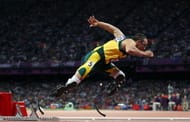Once upon a time (a time so long back that the information obtained about it was found inscribed on dinosaur bones), the world was consummately grounded in reality. No, not reality television, the original reality – the state of being actual or real. When humans realized that reality was too boring, we created fiction, the world of make believe. Now whatever your views may be on escapism and its various entailments and entrapments, the fact remains that our ancestors began the trend of birthing cosmoses and characters into a world existent purely due to the pregnancy of their imaginations. And thus, after many iterations in the practice of fiction, we observed the arrival of the most illustrious progeny of a wandering mind – superheroes. Those that created them, in all their wisdom, left behind an archetype, a manual if you will, so that their successors could find an easy enough way to create their own reality-bending characters. Here are five simple steps to create a superhero.
Step 1: Name
An extremely important consideration. We’re looking for something catchy but not something so gimcrack that the arch nemesis finds a way to use it to mock him. Preferably, one that tells us something about his superpower or its origin. Did a spider bite give him his unique abilities or would it be more appropriate to liken his powers to the enigmatic bat? Choose wisely, for your superhero will be hamstrung without a super name.
Step 2: Origins
Simply put, give the audience a sizable dose of the humble beginnings of the extraordinary protagonist. Everyone loves over-the-top abilities and villain bashing and so on. Be that as it may, a story having both its feet anchored in surrealism is one that the viewer doesn’t identify with. So exercise caution.
Step 3: Motivations
The ‘why?’ of the story. I know there’s this guy who has these superhuman powers and goes around beating bad guys to a pulp. But why? A story without a motive is like a flight of stairs without a railing. Step too close to the edge and you’re going to watch helplessly as the audience falls into the abyss of disinterest induced by the lack of a solid enough reason for the story to happen in the first place.
Step 4: Powers
Self-explanatory.
Step 5: The ‘X’ Factor
Now that you have chosen his powers, it’s time to pinpoint an ability that goes even beyond his superpowers. This is his ace in the hole. A characteristic so mind-blowing (to borrow from a term patently reality television) that it sends shivers down any scoundrel’s spine.
At this stage we have a pilot, a mould that simply needs to be filled with a few details and walla! you have your very own superhero.
Soon, however, reality dawns on us. It isn’t as easy as it seemed, this superhero production. Either all our ideas have been taken already or there don’t seem to be enough virtues to imbue our imaginary beings with. Incited by a bankruptcy of ideas, humans look back into the real world. Perhaps heroes had escaped the irons of myth and found their way into an actual existence. Allow me to give you an example of a superhero created as a consequence of our newfangled desire to see fiction being replicated in reality.
Name: The Blade Runner
Origins: Originally Oscar Leonard Carl Pistorius. Born 22 November 1986. South African. Born with fibular hemimelia, double amputee at 11 months old.
Motivations: A desire to stretch the limits of human perception, to show the world that “you’re not disabled by the disabilities you have, you are able by the abilities you have.”
Powers: Speed, endurance, resoluteness.
X Factor: J-shaped carbon-fibre prosthetics called the “Flex-Foot Cheetah”, affording him his superhero name.
We watched carefully as the hero we created grew in stature and became dear to many. So widely noted were his exploits that people world over claimed to be inspired by him. Soon, however, our folly reared its brazen head.
A gunshot. A death. An accusation. A trial.
We had been taught in a manner much too acrid that what had been the stuff of myth must remain that way. That the control we enjoyed over our fabricated beings had lulled us into believing that we exercised that same control over reality. The actions of real world characters have real world repercussions. A lesson we would do well to remember.
My intention is not to take away from anything Oscar Pistorius has accomplished or to proclaim him guilty, for that is the job of the law. On the contrary, I wish to restore to him the glory of his achievements. As people who have an abominable tendency to deify our sporting greats and bestow on them superhero status, we are all too familiar with the feeling of being let down. But why so? Because we believe we are entitled to our expectations. That it is not too much to expect sports-persons to behave a certain way off the field or to perform well constantly. But it is. It is too much to expect that.
Why not just enjoy sport for what it is. An exhibition of one glorious aspect of human ability – not the display of superhuman feats of strength and courage. Leave that for the comic books. So the next time we find out that the cyclist pedaled not just his cycle but also drugs, or that the golfing great is a serial philanderer, we won’t be left feeling short-changed by their deceit. Leave them be. Remember their heydays and the magnificent experience that it was to watch them do their thing. That, my friends, is how you really create a superhero.

